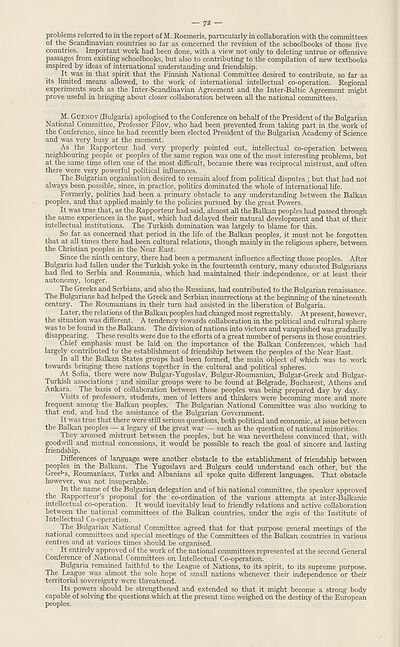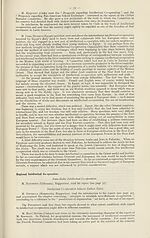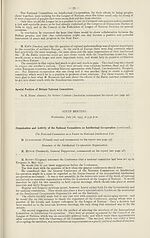International > Proceedings of the second General conference of national committees on intellectual co-operation, Paris, July 5th-9th, 1937
(74)
Download files
Complete book:
Individual page:
Thumbnail gallery: Grid view | List view

— 72 —
problems referred to in the report of M. Roemeris, particularly in collaboration with the committees
of the Scandinavian countries so far as concerned the revision of the schoolbooks of those five
countries. Important work had been done, with a view not only to deleting untrue or offensive
passages from existing schoolbooks, but also to contributing to the compilation of new textbooks
inspired by ideas of international understanding and friendship.
It was in that spirit that the Finnish National Committee desired to contribute, so far as
its limited means allowed, to the work of international intellectual co-operation. Regional
experiments such as the Inter-Scandinavian Agreement and the Inter-Baltic Agreement might
prove useful in bringing about closer collaboration between all the national committees.
M. Guenov (Bulgaria) apologised to the Conference on behalf of the President of the Bulgarian
National Committee, Professor Filov, who had been prevented from taking part in the work of
the Conference, since he had recently been elected President of the Bulgarian Academy of Science
and was very busy at the moment.
As the Rapporteur had very properly pointed out, intellectual co-operation between
neighbouring people or peoples of the same region was one of the most interesting problems, but
at the same time often one of the most difficult, because there was reciprocal mistrust, and often
there were very powerful political influences.
The Bulgarian organisation desired to remain aloof from political disputes ; but that had not
always been possible, since, in practice, politics dominated the whole of international life.
Formerly, politics had been a primary obstacle to any understanding between the Balkan
peoples, and that applied mainly to the policies pursued by the great Powers.
It was true that, as the Rapporteur had said, almost all the Balkan peoples had passed through
the same experiences in the past, which had delayed their natural development and that of their
intellectual institutions. The Turkish domination was largely to blame for this.
So far as concerned that period in the life of the Balkan peoples, it must not be forgotten
that at all times there had been cultural relations, though mainly in the religious sphere, between
the Christian peoples in the Near East.
Since the ninth century, there had been a permanent influence affecting those peoples. After
Bulgaria had fallen under the Turkish yoke in the fourteenth century, many educated Bulgarians
had fled to Serbia and Roumania, which had maintained their independence, or at least their
autonomy, longer.
The Greeks and Serbians, and also the Russians, had contributed to the Bulgarian renaissance.
The Bulgarians had helped the Greek and Serbian insurrections at the beginning of the nineteenth
century. The Roumanians in their turn had assisted in the liberation of Bulgaria.
Later, the relations of the Balkan peoples had changed most regrettably. At present, however,
the situation was different. A tendency towards collaboration in the political and cultural sphere
was to be found in the Balkans. The division of nations into victors and vanquished was gradually
disappearing. These results were due to the efforts of a great number of persons in those countries.
Chief emphasis must be laid on the importance of the Balkan Conferences, which had
largely contributed to the establishment of friendship between the peoples of the Near East.
In all the Balkan States groups had been formed, the main object of which was to work
towards bringing these nations together in the cultural and political spheres.
At Sofia, there were now Bulgar-Yugoslav, Bulgar-Roumanian, Bulgar-Greek and Bulgar-
Turkish associations ; and similar groups were to be found at Belgrade, Bucharest, Athens and
Ankara. The basis of collaboration between those peoples was being prepared day by day.
Visits of professors, students, men of letters and thinkers were becoming more and more
frequent among the Balkan peoples. The Bulgarian National Committee was also working to
that end, and had the assistance of the Bulgarian Government.
It was true that there were still serious questions, both political and economic, at issue between
the Balkan peoples — a legacy of the great war — such as the question of national minorities.
They aroused mistrust between the peoples, but he was nevertheless convinced that, with
goodwill and mutual concessions, it would be possible to reach the goal of sincere and lasting
friendship.
Differences of language were another obstacle to the establishment of friendship between
peoples in the Balkans. The Yugoslavs ard Bulgars could understand each other, but the
Greeks, Roumanians, Turks and Albanians all spoke quite different languages. That obstacle
however, was not insuperable.
In the name of the Bulgarian delegation and of his national committee, the speaker approved
the Rapporteur’s proposal for the co-ordination of the various attempts at inter-Balkanic
intellectual co-operation. It would inevitably lead to friendly relations and active collaboration
between the national committees of the Balkan countries, under the segis of the Institute of
Intellectual Co-operation.
The Bulgarian National Committee agreed that for that purpose general meetings of the
national committees and special meetings of the Committees of the Balkan countries in various
centres and at various times should be organised.
• It entirely approved of the work of the national committees represented at the second General
Conference of National Committees on Intellectual Co-operation.
Bulgaria remained faithful to the League of Nations, to its spirit, to its supreme purpose.
The League was almost the sole hope of small nations whenever their independence or their
territorial sovereignty were threatened.
Its powers should be strengthened and extended so that it might become a strong body
capable of solving the questions which at the present time weighed on the destiny of the European
peoples.
problems referred to in the report of M. Roemeris, particularly in collaboration with the committees
of the Scandinavian countries so far as concerned the revision of the schoolbooks of those five
countries. Important work had been done, with a view not only to deleting untrue or offensive
passages from existing schoolbooks, but also to contributing to the compilation of new textbooks
inspired by ideas of international understanding and friendship.
It was in that spirit that the Finnish National Committee desired to contribute, so far as
its limited means allowed, to the work of international intellectual co-operation. Regional
experiments such as the Inter-Scandinavian Agreement and the Inter-Baltic Agreement might
prove useful in bringing about closer collaboration between all the national committees.
M. Guenov (Bulgaria) apologised to the Conference on behalf of the President of the Bulgarian
National Committee, Professor Filov, who had been prevented from taking part in the work of
the Conference, since he had recently been elected President of the Bulgarian Academy of Science
and was very busy at the moment.
As the Rapporteur had very properly pointed out, intellectual co-operation between
neighbouring people or peoples of the same region was one of the most interesting problems, but
at the same time often one of the most difficult, because there was reciprocal mistrust, and often
there were very powerful political influences.
The Bulgarian organisation desired to remain aloof from political disputes ; but that had not
always been possible, since, in practice, politics dominated the whole of international life.
Formerly, politics had been a primary obstacle to any understanding between the Balkan
peoples, and that applied mainly to the policies pursued by the great Powers.
It was true that, as the Rapporteur had said, almost all the Balkan peoples had passed through
the same experiences in the past, which had delayed their natural development and that of their
intellectual institutions. The Turkish domination was largely to blame for this.
So far as concerned that period in the life of the Balkan peoples, it must not be forgotten
that at all times there had been cultural relations, though mainly in the religious sphere, between
the Christian peoples in the Near East.
Since the ninth century, there had been a permanent influence affecting those peoples. After
Bulgaria had fallen under the Turkish yoke in the fourteenth century, many educated Bulgarians
had fled to Serbia and Roumania, which had maintained their independence, or at least their
autonomy, longer.
The Greeks and Serbians, and also the Russians, had contributed to the Bulgarian renaissance.
The Bulgarians had helped the Greek and Serbian insurrections at the beginning of the nineteenth
century. The Roumanians in their turn had assisted in the liberation of Bulgaria.
Later, the relations of the Balkan peoples had changed most regrettably. At present, however,
the situation was different. A tendency towards collaboration in the political and cultural sphere
was to be found in the Balkans. The division of nations into victors and vanquished was gradually
disappearing. These results were due to the efforts of a great number of persons in those countries.
Chief emphasis must be laid on the importance of the Balkan Conferences, which had
largely contributed to the establishment of friendship between the peoples of the Near East.
In all the Balkan States groups had been formed, the main object of which was to work
towards bringing these nations together in the cultural and political spheres.
At Sofia, there were now Bulgar-Yugoslav, Bulgar-Roumanian, Bulgar-Greek and Bulgar-
Turkish associations ; and similar groups were to be found at Belgrade, Bucharest, Athens and
Ankara. The basis of collaboration between those peoples was being prepared day by day.
Visits of professors, students, men of letters and thinkers were becoming more and more
frequent among the Balkan peoples. The Bulgarian National Committee was also working to
that end, and had the assistance of the Bulgarian Government.
It was true that there were still serious questions, both political and economic, at issue between
the Balkan peoples — a legacy of the great war — such as the question of national minorities.
They aroused mistrust between the peoples, but he was nevertheless convinced that, with
goodwill and mutual concessions, it would be possible to reach the goal of sincere and lasting
friendship.
Differences of language were another obstacle to the establishment of friendship between
peoples in the Balkans. The Yugoslavs ard Bulgars could understand each other, but the
Greeks, Roumanians, Turks and Albanians all spoke quite different languages. That obstacle
however, was not insuperable.
In the name of the Bulgarian delegation and of his national committee, the speaker approved
the Rapporteur’s proposal for the co-ordination of the various attempts at inter-Balkanic
intellectual co-operation. It would inevitably lead to friendly relations and active collaboration
between the national committees of the Balkan countries, under the segis of the Institute of
Intellectual Co-operation.
The Bulgarian National Committee agreed that for that purpose general meetings of the
national committees and special meetings of the Committees of the Balkan countries in various
centres and at various times should be organised.
• It entirely approved of the work of the national committees represented at the second General
Conference of National Committees on Intellectual Co-operation.
Bulgaria remained faithful to the League of Nations, to its spirit, to its supreme purpose.
The League was almost the sole hope of small nations whenever their independence or their
territorial sovereignty were threatened.
Its powers should be strengthened and extended so that it might become a strong body
capable of solving the questions which at the present time weighed on the destiny of the European
peoples.
Set display mode to:
![]() Universal Viewer |
Universal Viewer | ![]() Mirador |
Large image | Transcription
Mirador |
Large image | Transcription
Images and transcriptions on this page, including medium image downloads, may be used under the Creative Commons Attribution 4.0 International Licence unless otherwise stated. ![]()
| League of Nations > International > Proceedings of the second General conference of national committees on intellectual co-operation, Paris, July 5th-9th, 1937 > (74) |
|---|
| Permanent URL | https://digital.nls.uk/195218137 |
|---|
| Shelfmark | LN.XII |
|---|
| Description | Over 1,200 documents from the non-political organs of the League of Nations that dealt with health, disarmament, economic and financial matters for the duration of the League (1919-1945). Also online are statistical bulletins, essential facts, and an overview of the League by the first Secretary General, Sir Eric Drummond. These items are part of the Official Publications collection at the National Library of Scotland. |
|---|---|
| Additional NLS resources: |
|

